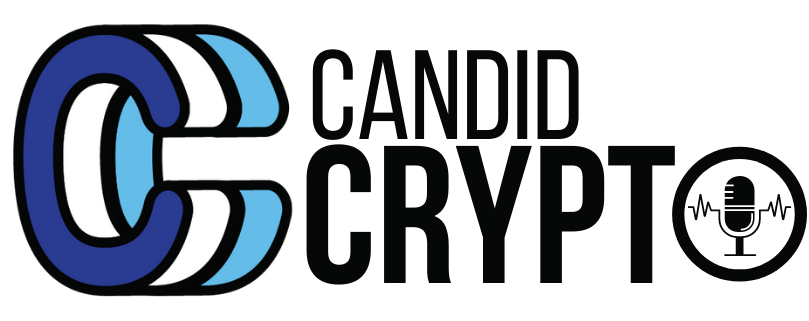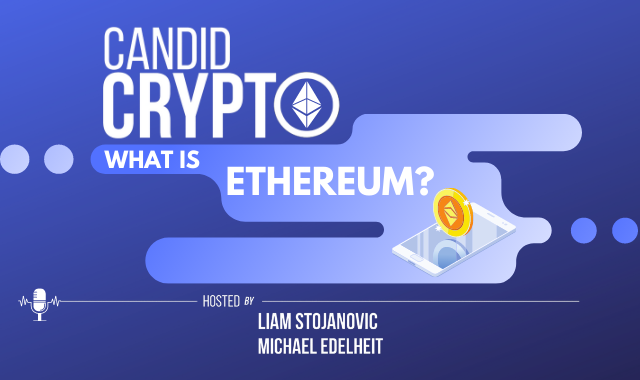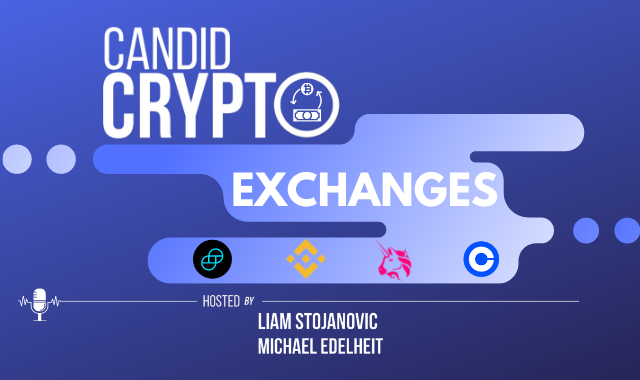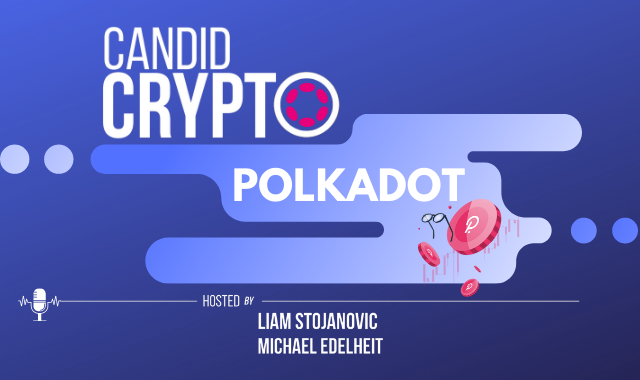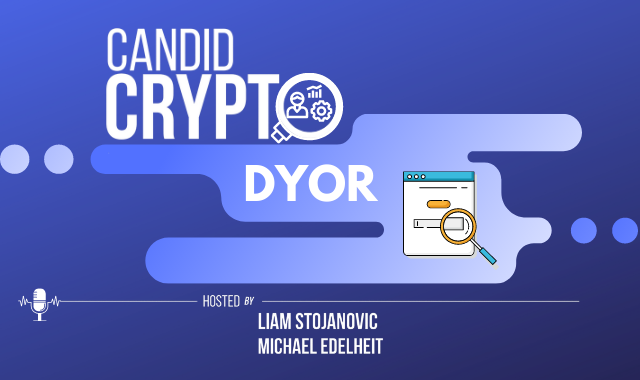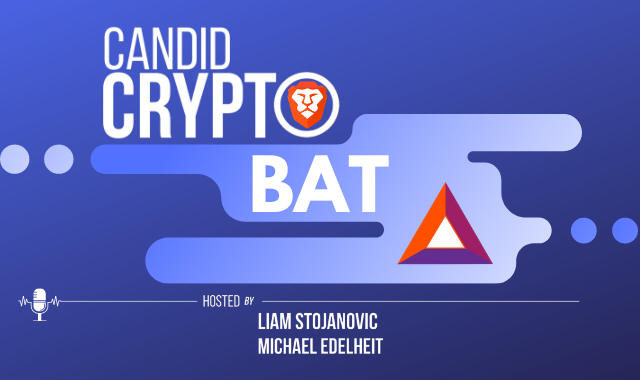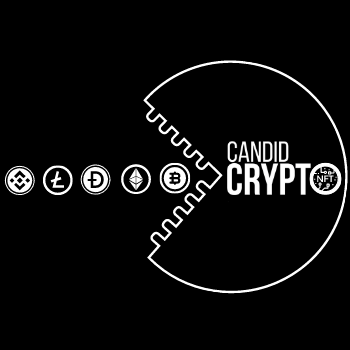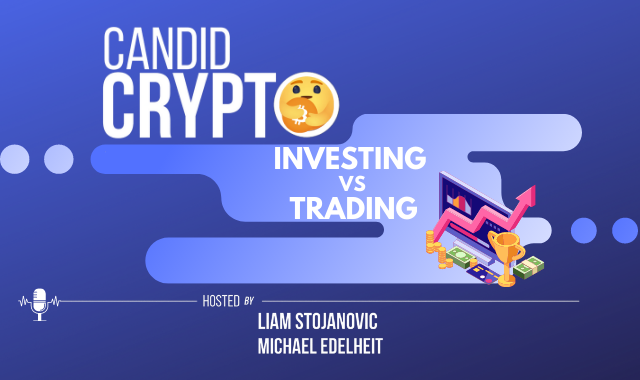003: What is Ethereum?
The computational blockchain. Why is a programmable blockchain important? What’s a DAO? Why buy an NFT?
Please leave a comment and let us know what you think about this episode. You can find Candid Crypto on all your favorite podcast platforms, so please like and subscribe to stay up to date on everything crypto!
In addition, every Candid Crypto episode is transcribed so you can easily understand everything that was discussed.
Episode Transcription – What is Ethereum?
Liam 00:02
Welcome to another episode of Candid Crypto. You’re tuned in with Liam and Michael.
Today’s episode is a little different. We’ve been listening to people’s feedback and we’re still trying to get a feel for how these episodes are going to flow and what the contents going to be. This episode is certainly more freeform.
Before we jump in, though, I want to briefly explain Ethereum to everybody.
Ethereum is a programmable Blockchain. In application, what that means is you can do a lot more stuff with your Ethereum than you can with Bitcoin. With Ethereum, I can lend it programmatically to people who are wishing to borrow it from me and earn interest on that loan. I can also purchase things like NFTs and have those tied to my unique address on the Ethereum network.
A programmable Blockchain also makes creating your own cryptocurrency pretty simple, especially considering how things were prior to Ethereum.
So if you’re the type of person who would go out and create your own cryptocurrency, you would have a much easier time convincing people to use your crypto because it already exists on the Ethereum blockchain, and all the Ethereum tools will be compatible with it.
By market cap, Ethereum sits firmly at no. 2, with no.1 being Bitcoin. Ethereum is one of the most traded and use cryptocurrencies that exist, largely in part due to the DeFi or decentralized finance phenomenon. The DeFi ecosystem is largely propped up by Ethereum. There are certainly more topics and concepts that we could go over with Ethereum on our website, CandidCryptoPodcast.com. We’re going to link a few of those resources for reading one on ones about how Ethereum works, what its underlying mechanisms are, and what sort of value proposition this new technology put forth.
Also, I’m aware of the fact our website looks a little bad on mobile, which is being fixed this weekend. So stay tuned for that. Here is a segue into our main discussion.
Michael 02:24
And honestly, that is when I was doing research on Ethereum. That’s essentially the verdict. You know, smart contracts are amazing, but it’s only as good as the coder or the programmer, building it. I mean, if you get too complicated, and you mess up this smart contract, there can be flaws when it comes time to actually executing all the constraints.
Liam 02:49
Totally. It paints a little bit of a historical picture of when Ethereum launched in 2015. The grand vision for Ethereum was to build up not only this ecosystem of smart contracts but to have an entity called the
DAO, the Decentralized Autonomous Organization exists. The point of the DAO was to crowdsource investment funds in the form of Ethereum, or Ether, I shouldn’t say, and the community would vote on proposals for where to invest that Ether. So what ended up happening is that the DAW was hacked [laughter] and when the DAO was hacked–
Michael 03:36
How much money? That’s the question, I want to know.
Liam 03:40
North of like 70 mil. off of a 150 million-plus investment, pretty bad to have half of your funds diverted to some random individual. So that was, in my mind, one of the biggest points of Blockchain history ever. The Blockchain was supposed to be immutable, and is supposed to be public. And no one was supposed to be able to tamper with it. But when the DAO hack happened, there was a huge portion of the Ethereum community that said, “This sucks”. And we want to undo this hack. [crosstalk] And the way they undid the hack was by performing what is called a Hard Fork. A Hard Fork for a cryptocurrency means that the underlying protocol or parameters are changed in a way that the networks are now incompatible.
Liam 04:35
So Ethereum basically became a new network without the hack, they rolled back the history of the hack and patch the holes in the code they had. However, …
Michael 04:47
Well, is that why now we have Ethereum classic and now Ethereum, which is the one that is actually growing in 2021.
Liam 04:58
Yeah. So in essence, yes, a small part of the community, the Etherium community said, “The hack happened fair and square, you lost that money because your code was bad. You should pay the price for that”. But the majority of people, obviously, stakeholders in this equation said, “We can Undo History. And we can make things right again”. And that ended up paying off because yeah, Ethereum takes enormous precedent over Ethereum classic.
Michael 05:27
Yeah, and I mean, I’m okay with the change because the community wanted it, and they led the charge to do this Hard Fork and split them.
Liam 05:37
Blockchains all about consensus and the consensus that the Ethereum community reached was, we should undo this hack. And I think that was a wise decision on their part. So kind of getting to the core question, what is Ethereum? Well, do we kind of talk about-
Michael 05:56
Yes, that it is a programmable blockchain, where Bitcoin is just transferring money to Ethereum although its cryptocurrency, actually named Ether can be used to transfer value. I mean, it comes down to the programmable aspects, like the Legos of blockchain.
Liam 06:17
Totally. Unlike Bitcoin, whose creator remains anonymous, Ethereum has a very clear leader Vitalik Buterin, a Russian Canadian programmer.
Michael 06:32
When he first created it, I think it’s crazy. But when he first created it, he was 19.
Liam 06:39
Yeah, when I was 19, I was you know, stealing plates from my dining hall at college and Vitalik went ahead and created a programmable Blockchain. So obviously, he is leaps and bounds beyond, you know, comprehension in some regards, because he went out and did it. He lives and breathes Blockchain. I love it, and-
Michael 07:04
Looks like an alien.
Liam 07:08
So does Elon Musk.
Michael 07:10
Vitalik really looks like an alien, but I mean, I would love to meet the dude. I mean, what a brilliant guy.
Liam 07:17
Totally, and Vitalik has plenty of explanations about Ethereum on YouTube that you can look up if you type in Vitalik Buterin YouTube. I mean, Vitalik Buterin Ethereum you’ll find stuff. The Lex Friedman podcast with him is very good.
Anyway, the Ethereum project had five founders, which if you listen to any Y Combinator kind of material, they will always say five founders is too many. But regardless, Ethereum went in with five founders, and they kept expanding sort of the founding team. And they formed Eth Suisse. And they based it out of Switzerland. At the time of our recording, May 6, 21. Ether just hit an all-time high of $3,530 could be more now. Vitalik has become the world’s youngest crypto bill.
Michael 08:24
Yeah, it’s crazy. And I mean, I’m pretty bullish on Ethereum. Just because it’s the second-largest cryptocurrency. And whenever I first found out about smart contracts, and once I really processed like, the power of smart contracts and the other things that you can do with Ethereum, which we’ll talk about in a second, I think we should definitely hit daps. But I am very bullish, because the more problems we solve with programming on top of that theory of network, I think it’s just going to be adopted way more, and you know, it’s $3500 now, I remember, it was definitely under… It was $300 a year ago.
Liam 09:14
Yeah, I scooped up some of it back in 2017 at $300
Michael 09:19
Yeah, I think I did too. But I mean, I hear people like Mark Cuban, really bullish and he thinks it. It’s all about the imagination of how many people adopted and the problems and the use cases that we can use with the Ethereum network, so it’ll be really interesting to see where it goes.
Liam 09:39
So Bitcoin was the first cryptocurrency and that’s why there’s so much interest and value in it currently, Ethereum created an ecosystem which Bitcoin did not. Ethereum lets you build what are called Dapps Decentralized Applications, by the nature of solidity as the smart contract underpinnings of Ethereum, you can create applications that do things like programmatically lend money to people who want to borrow money, or an even simpler example, you could write a smart contract that sends Ethereum to an address in, say, 10 years. So let’s say you wanted to create a crypto trust for your kid, you could set it to 18 years from their birthday, and then have those funds deposited 18 years from now.
Michael 10:34
You just have to code it in the smart contract. And then once it’s out there, it will be executed if all the conditions are met, like in 18 years when your kid grows up.
Liam 10:43
Yeah, and you wouldn’t explicitly state 18 years, you would state it in terms of blocks, blocks over time. So blocks in the Ethereum Blockchain are fairly consistent over time, if you look at like say, block 500, a block 501, the time could vary greatly between block 501 and say, 500, and still. But over the long term, if you’re looking at hundreds 1000s 10s of 1000s of blocks, it’s pretty consistent time intervals. And you can leverage that property to create, say, a time capsule of sorts, which I think is pretty cool. So where are DAPs really used? And where’s the kind of consumer facing applications? Where do they exist.
Michael 11:38
Top of the mind is DeFi which is Decentralized Finance apps, which I think are really important due to the fact that now you no longer need to rely on a bank and say if you’re in a country where your financial options are limited, or you have to have a certain number to actually even use the institutions. Now, anybody can use it. So I can see why DeFi is becoming really popular, you kind of spoke about using money.
Liam 12:13
Yeah, and I can also talk about borrowing money. Let’s say you have some Bitcoins are sitting on like, let’s say you have two Bitcoin, and you don’t want to sell your Bitcoin;
1. It’s taxable.
and
2. You lose your Bitcoin.
That’s a bummer. [laughter] What you can do instead is you can leverage decentralized finance to borrow on your Bitcoin. So let’s say you want to take out a $10,000 cash loan on @Compounds.Finance, which is one of the most popular DeFi platforms. You would go on to Compounds, you don’t have to make an account, which is brilliant, you don’t make an account, you only connect your wallet, once you connect your wallet, you deposit your funds. So let’s say you deposit $30,000 worth of Bitcoin. The numbers vary based on market conditions. But one of the key principles of borrowing money from decentralized finance is that you over collateralize the loan. So if you’re taking out a cash loan of $10,000, you’re usually going to over collateralize it by a factor of three to five times. So you’re going to have to put up like, say 30 to $50,000 with a Bitcoin.
Why?
Because crypto is volatile. If you watch the market on a day to day basis, it goes up and down by as much as 50 60%. It’s very unstable because this is a new paradigm. It’s a new technology, and anyone globally can trade this. Once you put up your collateral, the Decentralized Finance platform will automatically send you the cryptocurrency you wish to borrow. And that cryptocurrency can be… It could be say Ethereum, or it could be what is called a stable coin, like, USDT, US Dollar Tether.
Michael 14:03
I feel like Tether is the one that people typically know but we should probably cover that in a different episode.
Liam 14:10
Yeah, we’re not going to get into stable coins right now, what you do need to know about a stable coin is that 1 stable coin is equal to 1 US dollar or the currency it’s pegged to. So it’s very feasible to take your Bitcoin and programmatically receive a loan in the form of a stable coin that you can then go and convert to US dollars. And that is a really, really, really powerful financial instrument. Why? Because traditionally borrowing at 1% was reserved for higher net worth individuals. But since there is less and less asymmetry in the borrowing power of the individual versus large institution due to Blockchain, you can get a very competitive interest rate on borrowing Fiat currency from crypto and @Compounds.Finance is one of those sites. But there are many, many websites that exist for this same purpose. It’s a really-
Michael 15:16
I need to start using some of these services. And I’m going to declare it on this podcast right now. Ask me in a month, and I will have money in to one of these services and try one of these gaps and involve myself in the DeFi
Liam 15:32
Absolutely. Personally, I have staked a basic attention token into the Compound Finance protocol. Yeah, and I made interest off of my basic attention tokens. However, I found a platform that had higher interest rates, and I moved there, that platform is Celsius, but Celsius is not a Decentralized Finance platform. It’s Centralized Finance, with Blockchain cryptocurrencies. It’s a hybrid, their strength comes from its transparency and their community engagement.
Michael 16:17
Yeah, it’s going to be interesting to see where it goes, because I can only imagine these large financial institutions will try to make their own. I don’t know…. Could they make hybrids of their own? Or I work at an Insurance Group, and I’m curious, how [crosstalk]
Liam 16:38
— There’s probably that one guy who sits in on the senior meetings, who is basically the asshole who says, ‘We need to change things now, the world is very different than how it used to be’. And that, you know, I feel as though large corporations, you know, enterprise environments that, especially operate in the financial or insurance industry, they can adapt, but they need strong leadership at the top that says, We need to change now, we need to swim, or we’re going to sink. And I don’t know how feasible it is, let’s say JPMorgan Chase will create a decentralized finance project, it could definitely happen with strong leadership and a big resolve from senior leadership to change the status quo, but they have their core competency of Consumer and Business Banking. And, and as long as that is effective, and they’re meeting all the metrics for that, they’re not going to have a strong initiative to build really innovative products. So I’m not saying it couldn’t happen. But I’m warmer to the notion that small tech startups are going to really disrupt how we traditionally do banking.
Michael 18:07
Yeah, we will see, you know, no one knows. And, Liam, I wanted… Before we wrap up, I want to talk about some of the… We’ve talked a lot about all the benefits of Ethereum and the Ethereum network. I want to talk about some of the disadvantages, and some of the reasons why people are skeptical. I know in our first episode, we said, when you’re doing research, you got to look at the good and the bad. So let’s so what’s the top thing that comes to your mind when it comes to some of the negative aspects of Ethereum right now.
Liam 18:45
Ethereum is not a fixed supply of Ethereum as it exists right now, unlike Bitcoin, which is kept hard at 21 million coins. Ethereum doesn’t have the same sort of cap. There have been proposals to change how the Ethereum network functions so that Ethereum is “Burned” aka every block of the Ethereum since the network is destroyed. And the reason why you would want to deflate Ethereum is largely to increase its value, as well as to not have a nebulous uncapped cryptocurrency. I can see both arguments. At the end of the day, though, Ethereum doesn’t have a very clear cap for how many can exist. That’s my chief criticism of Ethereum. I think it should have a fixed supply. However, that’s definitely the pipe potential working pretty hard on making those changes. I don’t know the exact Ethereum roadmap off the top of my head, but the eip 1559 proposal suggests that Ethereum should be burned, as well as fairly allocating mining fees. So one of the other big problems with Ethereum which…
Michael 20:14
Oh, I was going to say, Liam, I was going to say, I’m surprised you use that as the first thing that comes to mind is the supply. You know, the thing that comes to mind for me, one of the biggest disadvantages is the prices and the gas fees. So gas is the term that people typically throw around when they’re talking about the fees it takes to actually execute a smart contract, or actually use the Ethereum network.
Liam 20:40
So when you send Ethereum to someone else, you pay gas, when you execute a smart contract, you pay gas. And the gas fees are pretty prohibitive right now. So let’s say you have $200 in Ethereum, and you want to lend it out to other people on a platform like Compound, you’re going to pay so much in gas, that it won’t be worth it for you to lend out your cryptocurrency. That’s just pretty much a fact. Right?
Michael 21:12
And I think some of the reasons why I’m a little bit hesitant, or I was, I’ve declared that I’m going to get into some DeFi applications. But I think I was hesitant because I don’t want to lose money on anything that I invest or play around with but I think… I just didn’t know what to expect with the gas fees. And after hearing some of the experience that you’ve gone through, you know, I just didn’t know but I think I needed just stop that mentality and just invest some money and use it as a learning opportunity.
Liam 21:47
You have some hard numbers, Michael, just one second, let me open up ye old [phonetic 21:52] Meta Mask. For those who are unaware Meta Mask is an easy to use browser extension that lets you send and receive Ethereum and Ethereum tokens. It’s awesome. And it’s pretty simple to use.
Michael 22:11
That sounded like a little advertisement [crosstalk]
Liam 22:14
co I’m looking at my Compound Finance Dashboard right now. I don’t have any cryptocurrency staked, I don’t have any cryptocurrency borrowed, I pulled it out. If I do look at the top right tab, I can see the compound their token, aka Compound Finances Token that I earned while staking my basic attention token. So just to step back and pull away for a second. What I just said, basically means the following.
When I lent my cryptocurrency on compound finance, I was awarded both the cryptocurrency I lent Basic Attention Token, as well as the cryptocurrency that governs compound finance, which is called “COMP”. So it’s twofold. You earn your crypto plus the governance token that the platform uses. We’ll get into DeFi heavily in another episode.
Michael 23:19
Yeah, that kind of goes over my head. [crosstalk]
Liam 23:23
I earned Compound governance token of about $64 worth of it. And I want to go ahead and claim that so I hit claim my compound. When I click that, to receive my $64.25 in Compound, I have to pay $34 in gas fees, there goes more than half of my compounds to gas fees.
Michael 23:51
And the fees go up when the network grows and it’s more congested as in just more people are on it [crosstalk]
Liam 23:58
Yeah, and the network ebbs and flows in terms of how much you’ll pay for transaction fees based on activity around the world. But in general, gas fees are pretty prohibitive for retail investors, even if you have right now, like 510 grand to play around with gas fees are going to be a pain point for you, and it’s really annoying honestly.
I am very hopeful that the Ethereum group will figure out how to alleviate these pain points with the Ethereum improvement proposal, as well as the eventual migration to proof of steak. But for now, we are dealing with high gas fees and we’re dealing with prohibitively expensive gas fees for the average person. Now just to wrap things up, Michael.
Michael 25:00
We’ve talked a lot [crosstalk] in this episode, smart contracts. [crosstalk] So I want to hit in the basics.
Liam 25:06
I want to just go over this last thing because it’s a hot topic right now. NFT’s Non Fungible Tokens. I know you’ve done some research into NFTs, and you’ve potentially looked into purchasing one yourself. Wink, wink.
Michael 25:23
I’ve tried it’s hard. It’s really hyped up.
Liam 25:27
So I mean, for the audience, what is an NFT? And why are people scrambling to get these things?
Michael 25:42
You know, people will collect anything. And if they think they can make money off their collectibles, you know, they’ll do what they can. But when I first heard Non Fungible Token, I had no idea what it meant. So I’m just going to quickly go over the term, but it’s an economic term, I had to look that up. But it’s an economic term that you could use to describe things like your furniture, a song file, a computer, really, anything that’s nonfungible is anything that cannot be interchangeable for another item. And it would be
Liam 26:16
So what basically means there’s one of something.
Michael 26:22
Yeah, one of something. So if we both had a $1 bill, and we exchanged it with each other, it would still be worth $1. You know, if I had a stuffed animal that meant something all my life or had a signature or something, who knows, and you had your stuffed animal, they’re not one for one, they really do have different values.
Liam 26:54
So in essence, NFT’s there’s only one and only one person on the Ethereum network can own that NFT. Unique to their public address.
Michael 27:08
Yeah. And they’re powered by smart contracts on the Ethereum Blockchain. For anybody that didn’t know. And I think, you know, they’re really cool, because you can now represent anything digital as a unique asset. And you can actually verify that it’s one of one depending on how you create it. Or if you turn it into a-
Liam 27:32
Yeah, across over for me is with NBA Top Shot. You know, my sports friends have reached out to me in the past and brought up NFTs and the different collectibles that the NBA has issued. And that to me is wild, they made a fantastic decision doing that someone at the top definitely said, “We need to change things now.”
Michael 27:58
And honestly, when I first heard about NFTs, I didn’t really understand it, because you can, it’s hard to wrap your head around it, because you could technically just take that video and copy it to your computer. Or if it’s a JPEG image, you just copy it to like your notepad. And then would not that mean that I own it, you know, I can carry it around in my phone all the time [crosstalk]
Liam 28:22
What it is. It’s this kind of bragging rights for you to say, Hey, you know what NFTs are, right? Well check out my NFT and check out what I own unique to my public address. So it’s not so much the underlying digital asset. It’s literally the ownership or the representation of ownership of the digital asset.
Michael 28:47
And it’s stored in your wallet.
Liam 28:49
Yeah, tuned for the Candid Crypto NFT. Coming soon…. [laughter] [crosstalk]
Michael 29:04
Yeah, I mean, it’s crazy. Who knows? You know, it’s really exciting because obviously there’s been a lot of money around it. It’s crazy because it’s been giving a lot of power to these content creators and actually giving them a real way to make money. And the most notable person, which, you know, they’re covering it on the news these days, but people he literally makes these, he makes up a piece of digital art every day. And he ends up selling them as NFTs, but he sold one huge collection of like, you know, 5000 of his pieces. We might have to fact check that number but he did it for like a few years. And he made a piece of art every day and he sold it for $69 million.
Liam 29:53
The beauty of NFTs is that anyone including you our dear listeners listening right I now can create an issue with an NFT, about whatever you want. And that’s why Blockchain and Blockchain technology is so powerful. Anyone can participate. You just got to learn.
Michael 30:17
Yeah, it’s a lot of fun. I mean, that’s why we’re making a podcast because we think we’ve learned enough certainly–
Liam 30:23
We’ve definitely been in the ecosystem for a while. So, you know, thank you very much for tuning into Candid Crypto. We hope you enjoyed today’s episode. Stay tuned for more content, Michael and I are doing a hackathon of a weekend to publish more content, and get more crypto goodies out there. And we’re planning to do a full launch of this podcast within a month, we want to get about eight episodes under our belt, and then blast this thing off to the community and begin our public release. You’re listening to the tentative beta right now. And we’re refining and continuing to improve our conversations and material. So we thank you for tuning in.
Michael 31:24
And if you are listening to this podcast, and if there are topics that we’re discussing that we went over too quickly, or you just still don’t understand because we’re still getting used to this, just reach out to us. We have our website, @CandidCryptoPodcast.com where you can reach out to us as well as discord and we have all that social media is being set up. So look us up, and reach out to us with any questions.
Liam 31:52
Our website is CandidCryptoPodcast.com. I am updating that website almost every single day. So please go to @CandidCryptoPodcast.com. It means a lot and we thank you so much for listening…
